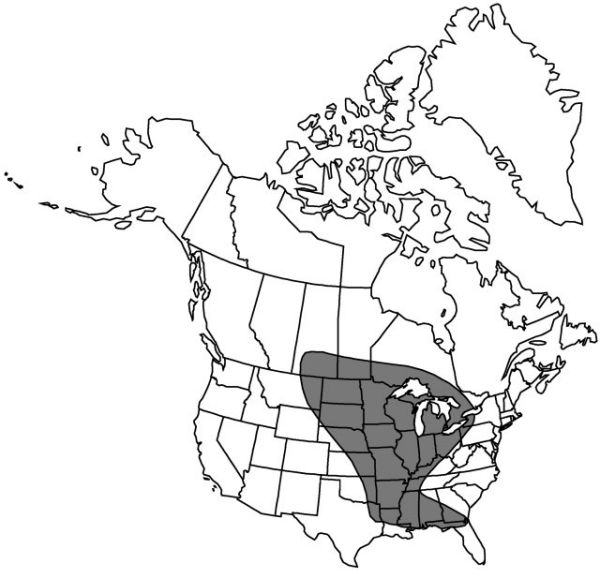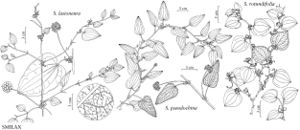Smilax lasioneura
Fl. Bor.-Amer. 2: 173, plate 187A. 1840.
Herbs. Stems annual, erect to ascending, branched, 2–2.5 m, herbaceous, glabrous; prickles absent. Leaves evenly distributed, proximalmost smaller, narrower; petiole 1.5–9 cm, shorter than blade; tendrils numerous, long, functional; blade not lustrous, pale green abaxially, ovate to round, 4–8 × 3–6 cm, not glaucous, pubescent abaxially, with transparent trichomes, base cordate, margins entire, convex, apex acuminate to rounded and cuspidate. Umbels many, axillary to leaves, to 35-flowered, dense, globose; peduncle to 12+ cm, short. Flowers: perianth greenish; tepals 35–45 mm; anthers equaling or shorter than filaments; ovules (1–) 2 per locule; pedicel 0.5–1.5 cm. Berries bluish black to black, subglobose, 8–10 mm, glaucous. 2n = 26.
Phenology: Flowering May–Jun.
Habitat: Rich, alluvial woods, thickets, borders
Elevation: 300–700 m
Distribution

Man., Ont., Sask., Ala., Ark., Fla., Ga., Ill., Ind., Iowa, Kans., Ky., La., Mich., Minn., Miss., Mo., Mont., Nebr., N.Y., N.Dak., Ohio, Okla., Pa., S.Dak., Tenn., Tex., Wis., Wyo.
Discussion
Smilax lasioneura is primarily distributed in the central plains and lower elevations of the Appalachian and Rocky mountains. Plants distributed in the southern humid areas tend to be larger than those of more northern areas.
Selected References
None.
